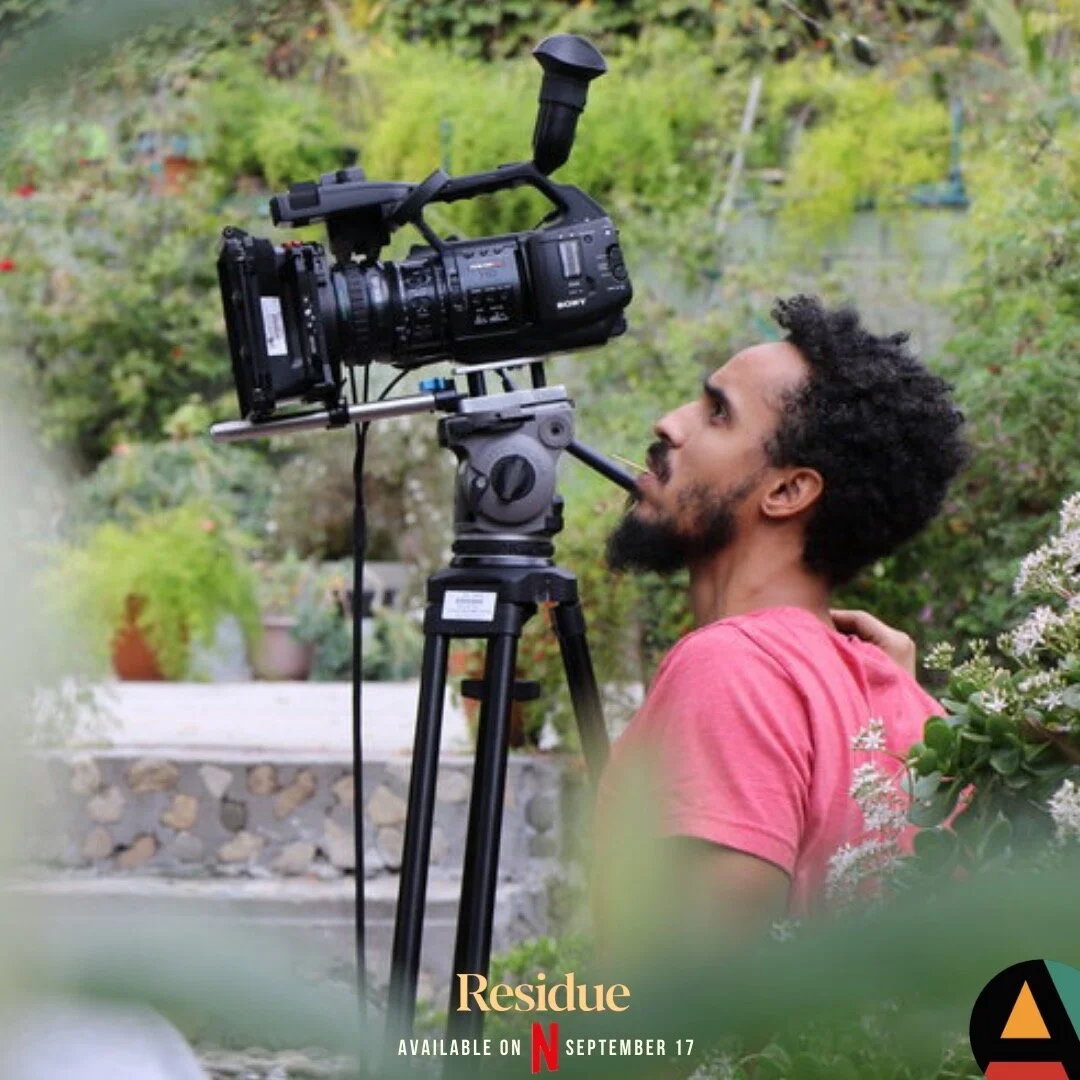Exclusive: Writer-Director Merawi Gerima On His Directorial Debut ‘Residue’
Currently on Netflix and in select theaters from ARRAY Releasing is the award-winning drama RESIDUE, directed, written, produced and edited by first-time feature filmmaker Merawi Gerima, son of celebrated Ethiopian filmmaker Haile Gerima, a legendary figure in the L.A. Rebellion film movement.
After its world premiere at the 2020 Slamdance Film Festival, RESIDUE won the Audience Award for Best Narrative Feature and the Acting Award for star Obinna Nwachukwu. RESIDUE is also an official selection of the 77th Venice International Film Festival’s Giornate degli Autori.
RESIDUE chronicles aspiring filmmaker Jay (Nwachukwu) who returns to his native Washington, DC to find his old neighborhood is gentrified beyond recognition. Dealing with alienation from his friends, troubled by the disappearance of a loved one and unsure of his place in this new community, Jay confronts issues of identity, isolation and loss on a tumultuous personal journey.
The film's exploration of the impact of gentrification, underemployment and Black male identity in Washington D.C. conjures the current interrogation of the systemic racism plaguing Black communities nationwide.
BlackFilmandTV.com spoke exclusively with Gerima on the making of this film and landing Array as its distributor.
How did the story come about for you?
Merawi Gerima: I'm from Washington, D.C. I was born in 1988. So I grew up in the 90s. It was a very specific kind of place, the wellspring from which every time I open my mouth to express myself, that's where I'm pulling from. One year in the summer of 2016, I was confronted with the really brutal reality of gentrification in Washington D.C., and in such a way, where I was involved in just direct confrontations with entitled folks who appear that they crash landed in the city and could not imagine that people existed there before they got there. And so, the script for Residue began as an angry response to what was happening around me. It was maybe vengeful at that time, at that early stage. There was a deeper story, which I had been tussling with for a lot longer, about basically the loss of my friends in DC and trying to figure out what has happened to the people that I grew up with. Once these two stories combined, that's when this whole thing really came into its own, in a really beautiful way.
Can you talk about putting this story together with a lot of newcomers?
Merawi Gerima: We wouldn't have been able to afford seasoned actors or professional actors anyway. But beyond even that, it was more important to me to find people who reflected DC as I knew it. I’m talking authentic DC accented people, who know the story that I'm trying to tell, because we had no time anyway, no time to explaining things to people. Dennis Lindsey, who plays Delonte, and if you take him for example, he embodies Southeast DC. That type of authenticity is hard to find in the ranks of professional actors, as I've seen it. I’ve experienced them on the coast. I’ve heard the DC accent by somebody who’s faking it, being acted on and it never really rings true to my ears. So for me, the authenticity was the most important thing.
How did you combine two stories, the story of gentrification and being away and the story of the missing friend?
Merawi Gerima: At a certain point, they intersect. The terrible things that my friends are experiencing, it's part and parcel of gentrification itself. It's all connected, police brutality, the disinvestment of black communities around the country, and this so called war on drugs. Those are just different facets of the white supremacist arrangement, which is destroying black communities and causing us to remain connected for any any period of time. So, at a high level, it's all connected and it flowed easily because it was just an emotional response to this singular cause. Why can't we build and maintain and hold on to our community and our community members?
Making a film is one challenge, getting distribution is another challenge. How did Array come into the picture?
Merawi Gerima: Actually, I reached out to Array and Tilane Jones, the incredible President of Array, and she had a contingent in Utah for Slamdance. We got into Slamdance and I invited them to a screening. They came and after the screening, that’s when we started talking about distribution and things like that.
I can't imagine this film being anywhere else. For one Array is so singular and unique with what they do with black films and black stories and their ability to see the true value of these types of projects. Two, because they really a kindred force in the film industry. They work so far outside of what we see as their means. They punch so far above their weight class. This small group, with the incredible amount of output that they do, it just makes sense that we joined forces on this project; because we can upgrade from a similar state of mind in terms of what's possible for black storytellers.
What did you learn afterwards that you can take off your next project?
Merawi Gerima: A film production is a mirror, and it shows you every part of yourself, where you're strong and where you're weak. You've never so true as it was for us and revenue. And I think that we'd be here all day if I tried to take all the different ways that I grew from the project, I'll say it was the best film school ever attended. I would also say we became very good at making Residue, and I think that it's important to to say because the next project I intend to come at as a as a newcomer once again.
What is the story and to see that I'm new in the early stages and making the story, I intend to get better at making this film as the days go on, as production goes on. That's how I try to move into every project, to recalibrate and set myself at zero once again so that I can be learning as a student of that process of making that project.






